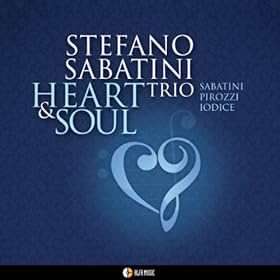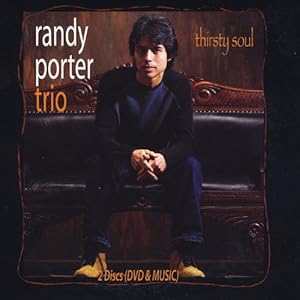Poetic Memory: Live @ The Sunside

Alexis Tcholakian unveils its new album "POETIC MEMORY" he guides us on the notes of major works from the classical repertoire of Bach, Chopin, Schubert, contemporaries as Baden Powell, Petrucciani, until his subtle compositions. This "Poetic Memory" enlightens us on his romantic shimmering wire timeless themes.
Alexis Tcholakian - piano ; Claude Mouton - doublebass ; Thierry Tardieu – drums.
Lorenzo Tucci Quartet
Sweet Revelation

01. Adam’s apple
02. Sweet revelation
03. In the wee small hours of the morning
04. Dede’s mood
05. Fee-fi-fo-fum
06. Ghost
07. Tita’s song
08. My heart belongs to daddy
Etichetta: Philology
Formazione: Lorenzo Tucci (dm) Daniele Scannapieco (sax) Pietro Lussu (p) Dario Rosciglione (cb)
Giovanni Mazzarino Quartet
In Sicilia Una Suite

By Francesco Martinelli per Jazzitalia
Giovanni Mazzarino, è stato già notato, non gode della considerazione che dovrebbe avere come uno dei nostri maggiori pianisti. Purtroppo nel jazz – come nelle altre arti – a volte la notorietà è inversamente proporzionale alla qualità della proposta musicale, e Mazzarino oltre ad essere schivo di carattere è anche profondamente legato alla sua Sicilia, lontano in qualche modo da tutti i centri dell'informazione e dell'industria musicale. Ma fate il suo nome a qualche musicista che ha avuto il privilegio di suonare con lui – a me è capitato in Turchia, dove Giovanni ha tenuto parecchie residenze all'Istanbul Jazz Center di Ortakoy – e non riceverete altro che lodi, complimenti ed espressioni di meraviglia. Conoscitore del pianoforte classico e della tradizione jazz, raffinato e solido accompagnatore di vocalist – impressionante la lista delle sue collaborazioni - uomo dalla conversazione ricca e interessante, si infervora parlando della difesa e della valorizzazione delle tradizioni culturali siciliane e soprattutto di Piazza Armerina – uno dei più importanti centri archeologici del Mediterraneo – dove da tempo sviluppa e dirige un progetto estivo ad ampio raggio, Piazzajazz, che sperabilmente culminerà con eventi dedicati alla riapertura – dopo restauro e nuovi scavi - della celebre Villa Romana del Casale.
Questa sua ultima fatica da leader si inserisce a pieno titolo in questo "lavoro culturale": una suite dedicata a colori e profumi dell'isola, sintetizzata dalla frase di Goethe che non si può che sottoscrivere: "L'Italia, senza la Sicilia, non lascia alcuna immagine nell'anima. Qui è la chiave di tutto". Non sono necessari commenti in rapporto alla temperie di violenta ignoranza in cui viviamo.
La produzione è preziosa: oltre al lavoro di studio di Stefano Amerio e del suo Artesuono, ormai una firma di garanzia a livello europeo e mondiale, il Cd è accompagnato da un libretto di foto di Pino Ninfa dedicate alla Sicilia e ai musicisti. Malgrado il piccolo formato la qualità della riproduzione e la forza delle immagini sono tali da indurre l'ascoltatore a riprendere in mano il libretto, assaporando le foto in rapporto alla musica e situandole nella cartina inserita – una geografia dell'anima con solide basi concrete, che porta in luoghi celebri e in altri sconosciuti.
E' davvero un caso in cui limitarsi ad ascoltare in cuffia degli appiattiti mp3 priva dell'esperienza vera del progetto...
Per realizzare quest'idea Mazzarino ha riunito una delle formazioni più classiche del jazz post 1960, il quartetto con sax, invitando Rosario Bonaccorso al basso, uno dei più apprezzati bassisti italiani per la grande esperienza e la capacità di propellere tutto il gruppo, che qui si conferma ai massimi livelli; il giovane ma già autorevole batterista abruzzese Nicola Angelucci, e il sassofonista Max Ionata, che negli ultimi anni ha vertiginosamente accresciuto maturità e ricchezza espressiva.
Tutti segnali della passione con cui è stato realizzato il disco, ma il cuore di tutto alla fine sono la musica e le idee di Mazzarino: anche se amplissimo è lo spazio lasciato agli altri musicisti – infatti non si tratta affatto di un pianoforte "accompagnato" da altri ma di un sound collettivo - tutto è alla fine profondamente suo, nutrito dall'ampiezza dei suoi riferimenti. Non si pensi a un disco elegiaco, irenico: come nella storia della terra cui è dedicata in questa musica ci sono fratture, dramma e grido – particolarmente espressivo il sax di Ionata in diversi passaggi – che si accompagnano a melodie colorate dall'amore per il jazz, per la tradizione europea del pianoforte e per le tradizioni musicali siciliane, cui si fa riferimento in maniera non Oleografica. Le risorse del gruppo sono sfruttate con intelligente duttilità, e passaggi arrangiati in modo sorprendente si alternano a improvvisazioni collettive di grande impatto o quiete meditazioni solistiche, e nessun brano obbedisce a regole "standard" di durata o struttura dettate da considerazioni esterne: si va dai due minuti di Taormina, con il brillante pianismo dell'introduzione e il nervoso tema, ai nove dell'esplosivo Stromboli, con la crescente tensione generata da sax, basso e batteria, cui segue Marzamemi, reso ancora più efficace dal drammatico cambio di atmosfera: un arpeggio pianistico colorato da uno svolazzo arabescato che introduce una sinuosa melodia impreziosita dal timbro brunito di Ionata, sviluppandosi poi in passaggi dall'elastico swing. Non a caso al centro dell'album sta Piazza, una meditazione sospesa e incantata, notturna ed evocativa come la foto di copertina dell'album: il brano in qualche modo raccoglie e sintetizza gli umori di tutto il lavoro, mettendo in evidenza l'originale pianismo del leader, le contromelodie di Bonaccorso, la misura di Angelucci e ancora Ionata, questa volta in una vocale predicazione al soprano.
Ma il lettore è caldamente invitato a raccogliere direttamente le proprie impressioni seguendo in prima persona passo passo questo viaggio in Sicilia con la guida d'eccezione di Giovanni Mazzarino.
Tracks:
1. Muorica
2. Ibla
3. Milo
4. Stromboli
5. Marzamemi
6. Rosa di Jonia
7. I ceri e i devoti
8. Piazza
9. Ganzirri
10. Noto
11. Scicli
12. Morgantina
13. Ortigia
14. Taormina
15. Scoglitti
Giovanni Mazzarino - piano
Max Ionata - saxes
Rosario Bonaccorso - bass
Nicola Angelucci - drums
Fotografie - Pino Ninfa
John Taylor
Giulia's Thursdays

By CamJazz
What a wonderfully curious and receptive musician John Taylor is. An artist perpetually searching; through his piano playing he is able to give new life to all that passes through his hands.
And this time with a trio especially dear to him, with whom he had already published for CAM Jazz the beautiful "Requiem For A Dreamer" (which also saw the participation of saxophonist Julian Argüelles). The focus falls on the music by Italian composer Carlo Rustichelli. A heartfelt tribute by Taylor to the music composed by Rustichelli for film and television signed by directors Nanni Loy and Pietro Germi.
"Giulia’s Thursdays" becomes a necessary passage on the contemporary scene in order to understand the evolution of the piano trio. Palle Danielsson on bass is powerful and melodic, a valuable reference within the themes written by the pianist with rare elegance given by drummer Martin France. A rapport of the three, whose common denominator is recognizable in the melody. The lyricism of the instruments reaches unparalleled peaks, and the sensitivity of Taylor returns to us the precious lyrical soundtracks like those of Divorce Italian Style, The Thief of Bagdad or Giulia’s Thursdays.
Recorded and mixed in Ludwigsburg on 20, 21, 22 October 2006 at Bauer Studios
Recording & mixing engineer Johannes Wohlleben
By Cormac Larkin
Often underrated – and frequently a harmonic foil for others, in particular trumpeter Kenny Wheeler, for whom he has been a regular sideman – Manchester-born pianist John Taylor is, in his own quiet way, the finest jazz pianist Britain has produced since George Shearing. A rare combination of melodic lyricism and rhythmic adventure, his playing is virtuosic but never verbose, and he has an uncanny ability to get under the skin of a tune. Though he has recorded in many formats over the years, he returns again and again to the trio, and his current trio, with the great Palle Danielsson on bass and heavyweight English drummer Martin France, is a finely honed unit. Giulia’s Thursdays is a collection of melodies by the prolific Italian film composer Carlo Rustichelli which the trio have reconfigured like a suite, the composer’s charmingly romantic themes setting up some taut group interplay from three masters of the art.
Ulf Wakenius
Vagabond

By Ian Patterson
Swedish guitarist Ulf Wakenius is perhaps best known for his ten year stint in pianist Oscar Peterson's trio, following in the footsteps of guitarists Barney Kessel, Herb Ellis and Joe Pass. Wakenius clocked up enough road miles with Peterson to have traveled to the moon and back, and he also toured extensively and recorded with bassists Ray Brown and Niels-Henning Ørsted Pedersen. These heavyweight associations have tended to overshadow his own projects as leader, which date back more than two decades to his group with drummer Jack DeJohnette, saxophonist Bill Evans, trumpeter Randy Brecker, pianist Niels Lan Doky and bassist Lars Danielsson.
Since signing to ACT Music in the mid-2000s, Wakenius has paid singular tribute to two of the most influential pianists of the last forty years, Keith Jarrett on Notes from the Heart (ACT Music, 2005) and the late, sorely lamented Esbjorn Svensson on Love is Real (ACT Music, 2008). In the process, Wakenius has demonstrated his proclivity for interpreting a tune with originality and respect. The acoustic Vagabond is a halfway house between original material and covers, and explores a wide range of stylistic and emotional terrain. English guitarist John McLaughlin once wrote that Wakenius sounded as if he was born with a guitar in his hands, and in truth he has never sounded better.
Wakenius' virtuosity is a given, though his lightening fast runs which pepper the set could slacken the jaws of the most jaded guitar aficionados. However, even his most fluid lines, on pianist Lyle Mays's lovely "Chorinho" or Attila Zoller's infectious "Birds and Bees, (a duet with son Eric), have tremendous melodic narrative. Wakenius demonstrates subtlety and lyricism on a beautiful interpretation of Jarrett's "Encore" and on the self-penned "Song for Japan," where damped strings create the sound of a Japanese lute, on this moving ode.
Wakenius conjures the troubled Middle East on the dramatic "Breakfast in Baghdad." Danielsson's bass brings powerful counterpoint to the guitarist's darting lines, while accordionist Vincent Peirani reprises the role singer Youn Sun Nah performed with Wakenius on her own Same Girl (ACT, 2010). Wakenius and Nah have formed a striking partnership in recent years and she lends her seductive vocals to a beautifully simple but affecting take on The Police classic "Message in a Bottle," with guitarist Nguyên Lê adding wavy, singing lines. Peirani and Danielsson make significant contributions throughout; the accordionist weaves delightful French, Argentinean and Arab textures—his playing on the dramatic title track is exceptional— while the bassist lends two striking compositions in the form of the blues-tinged nostalgia of "Psalmen" and the gentle, Iberian-flavored "Praying."
Wakenius pays personal tribute to saxophonist Jim Pepper on "Witchi-Tai-To," complete with memorable Native American chants. Wakenius' star shines brightly on these 11 cuts, though it is the space he allows for all the voices on Vagabond which ultimately makes it such a resounding success. Uniformly strong compositions and wonderful, empathetic playing from all mark this recording out as one of the guitarist's finest efforts. One more time to the moon and back, please.
Track Listing:
Vagabond; Message in a Bottle; Bretagne; Psalmen; Breakfast in Baghdad; Song for Japan; Birds and Bees; Praying; Chorinho; Witchi-Tai-To; Encore.
Personnel:
Personnel:
Ulf Wakenius: acoustic guitars, oud, chant; Vincent Peirani: accordion, accordina, voice; Lars Danielsson: bass, cello; Eric Wakenius: acoustic steel string guitar; Michael Dahlvid: darbuka, cajon; Youn Sun Nah: vocals (2); Nguyen Le: electric guitar (2).
Shai Maestro, Ziv Ravitz, Jorge Roeder

By John Fordham
Israeli-born pianist Shai Maestro is familiar to UK audiences through his often thrilling work with bassist/composer Avishai Cohen. He's now confirming that promise in his own group, with sometime Lee Konitz drummer Ziv Ravitz and Peruvian bassist Jorge Roeder, on an all-original repertoire except for the wistfully dignified traditional song Kalimankou Denkou. Cohen's swaying, romantically intense and cinematic music is immediately evoked in the alternately rippling and thunderous Confession, while the jaunty Brave Ones sounds like a country-rock ballad (but develops with a catchily EST-like balance of freedom and certainty), and the meditative Painting is a reverie under which arco bass murmurs and intensifying cymbal splashes steadily swell. Maestro's classical touch retains an expressive delicacy whatever the mood. Occasionally he restricts himself to fragmentary phrases inserted into remorseless drum-hooks and Roeder's luxurious basslines, and The Flying Shepherd is a childlike dance that develops as a rhythm-stretching game. The Avishai Cohen dedication One for AC could have come straight out of the repertoire of this gifted young pianist's famous mentor. Maestro's solo career is going to be one to watch.






























